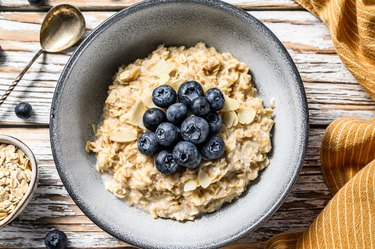
Millions of Americans experience recurrent heartburn. Spicy foods are a common culprit, but even oatmeal may cause heartburn for some people who have oat sensitivities. But is it the oats? Good news: There are tips that may help you enjoy that oatmeal and prevent symptoms.
Read more: What Is the Nutritional Value of Oatmeal?
Video of the Day
Video of the Day
All About Oats
Plain oatmeal is not generally associated with acid reflux, meaning that it isn't likely to trigger symptoms for most people. On its own, the whole-grain cereal is actually an ideal part of the kind of diet that may help to control acid reflux and suppress symptoms, according to an April 2013 study in Gastroenterology Research and Practice.
Keep in mind, recommended dietary guidelines for acid reflux are just that — guidelines. They don't anticipate every food that might trigger heartburn for you because the problem is highly individual. One person may enjoy oatmeal without an issue while another person enjoying the same meal may experience acid reflux.
"Heartburn can be the result of a variety of issues," explains Rajsree Nambudripad, MD, an internal medicine doctor at St. Jude Medical Center and founder of OC Integrative Medicine, both in Fullerton, California. "Sometimes it is an allergy or sensitivity to a food. The food does not agree with you so it comes back up after eating. In the case of oatmeal, it could be a sensitivity to oats or some of the toppings. It really depends on the person and how the oatmeal is prepared."
What’s in Your Oatmeal?
It may not be oatmeal itself causing your heartburn but what you're adding to your oatmeal that is triggering the problem.
For instance, oatmeal made with whole milk or topped with butter may be troublesome because high-fat foods tend to relax the lower esophageal sphincter muscle, which can allow stomach juices to flow back up into the esophagus, causing heartburn, notes the National Institute of Diabetes and Digestive and Kidney Diseases
"If brown sugar on your oatmeal is causing heartburn, you could try a small amount of maple syrup instead," says Dr. Nambudripad. "Maple syrup is a good natural sweetening option since it has many trace minerals." Or, consider cinnamon. "You can actually reduce the amount of sweetening needed in your oatmeal by adding cinnamon," he says. "Cinnamon is typically well tolerated and makes things seem sweeter without adding any sugar."
Also, Harvard Health Publishing notes that a wheat allergy can contribute to inflammation in the esophagus that causes reflux-like symptoms. And oats are often processed in the same facilities that process wheat, which creates the risk of gluten contamination, according to a September 2019 review in Frontiers in Pediatrics.
Dr. Nambudripad recommends choosing a brand of oatmeal that is certified gluten-free if you are gluten sensitive and experience heartburn after eating plain oatmeal.
Read more: The 9 Best Natural Remedies for Heartburn
Preparation Suggestions
Next time you make oatmeal, take steps to reduce the risk of triggering heartburn. For instance, use gluten-free oats and cook them in water or low-fat milk — skip the dairy milk if you're lactose-intolerant.
Don't make too much oatmeal — portion control is important to avoid overeating, says Dr. Nambudripad. "The smaller the portion of food you eat, the easier it is for your stomach and intestines to break it down and digest it quickly so that it won't have a chance to come back up and cause heartburn," he says. "If you overstuff yourself, there is high likelihood of causing reflux."
The U.S. Department of Agriculture recommends 1/2 cup as the appropriate serving size. You will need 1/4 cup of dry oats to yield a half-cup serving of cooked oatmeal.
Also, cook the oats thoroughly. "Partially cooked or raw oats are harder to digest," says Dr. Nambudripad. "If you have a sensitive digestive tract, make sure your oats are cooked fully."
Sleuth It Out
Don't be too quick to blame oatmeal for your heartburn if it's only part of your breakfast routine.
The American Academy of Family Physicians reports that citrus fruit juices, coffee and tea have been known to trigger acid reflux. Likewise, eating too much or too quickly can bring on heartburn, as can stress, wearing tight clothes or lying down too soon after mealtime.
One way to find out which foods you tolerate well is to keep a journal that details what you eat and how you feel afterward.
- Rajsree Nambudripad, MD, ABIHM, internal doctor, integrative medicine specialist, St. Jude Medical Center, Fullerton, California
- USDA ChooseMyPlate: “All About the Grains Group”
- American Academy of Family Physicians: “Heartburn”
- Harvard Health Publishing: “Eosinophilic Esophagitis: A New Food-Related Allergic Condition on the Rise?”
- Frontiers in Pediatrics: “To Be Oats or Not to Be? An Update on the Ongoing Debate on Oats for Patients With Celiac Disease”
- Gastroenterology Research and Practice: “Dietary Intake and Risk for Reflux Esophagitis: A Case-Control Study”
- National Institute of Diabetes and Digestive and Kidney Diseases: "Symptoms & Causes of GER & GERD"
Is this an emergency? If you are experiencing serious medical symptoms, please see the National Library of Medicine’s list of signs you need emergency medical attention or call 911.